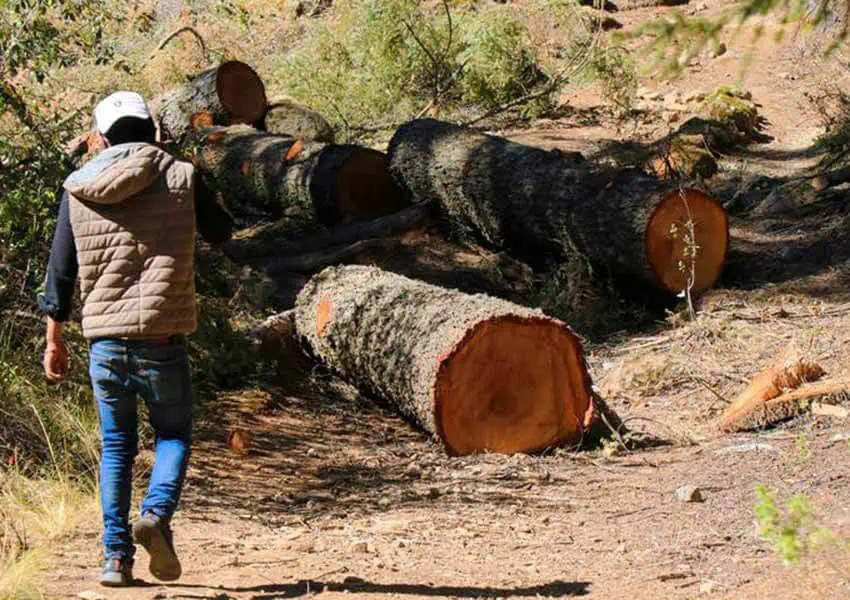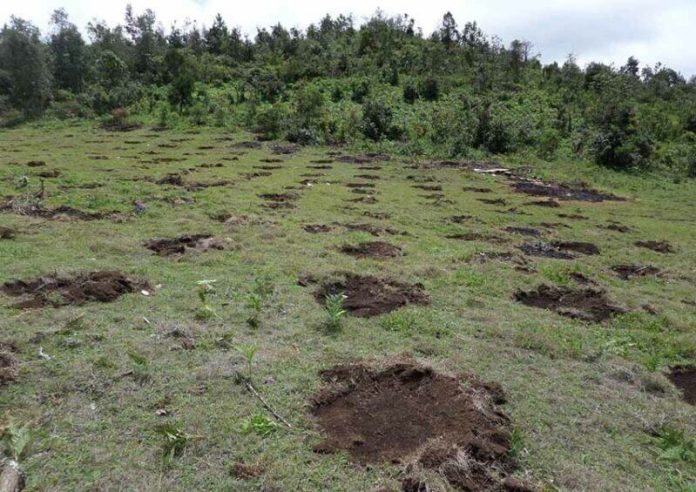More than 300,000 square kilometers of forested land – about 15% of Mexico’s territory – have been depleted due to illegal logging carried out by criminal groups, according to the environmental protection agency Profepa.
In a document cited by the newspaper El Universal, Profepa said there are 122 areas of forested land where severe deforestation has occurred due to “the high incidence of illegal logging related to organized crime groups.”
Those areas cover 313,500 square kilometers. Mexico’s total land area is approximately 1.97 million square kilometers.
According to the El Universal report published Monday, Mexico lost 662,000 hectares of primary forest between 2002 and 2020. About one-third of the lost forest – 228,000 hectares – was located in the 122 areas where severe deforestation has occurred, the newspaper said.
Illegal logging is mainly to blame, according to the organization Reforestamos México, which advocates for sustainable and legal logging. “Illegal logging is a widespread problem in Mexico,” said Emilio Cruz, one of the organization’s directors.

The reason why it is so widespread, he said, is because felling trees illegally is cheaper since loggers avoiding paying taxes and wood export permits. Cruz also acknowledged that logging is “another business” for crime groups, which have diversified beyond activities like drug trafficking and extortion.
“In Mexico, 24 million cubic meters of wood are used per year. If we take into account that 8 million [cubic meters] are produced legally and 8 million are imported, this speaks of there being another 8 million [cubic meters] of which we don’t know the origin,” he said.
According to the National Forest Commission (Conafor), the bulk of that amount comes from illegal logging. It said in a 2019 report that the origin of 7 million cubic meters of wood that leave sawmills on an annual basis is illegal logging. The market value of that wood is above 7 billion pesos (US $343.5 million), Conafor said, underscoring just how lucrative illegal logging can be.
“Measuring illegal logging is complex, said Xiomara Domínguez, public policy coordinator at Reforestamos México.
“Profepa estimates that it’s 70% [of all logging] but they don’t have clear methodology,” she told El Universal.
Domínguez suggested that some legal sawmills are processing more wood than they are authorized to process. She also said that illegal sawmills operate in Mexico.
The federal government itself has acknowledged that illegal logging is encouraged by “the weakness of the rule of law,” a situation which El Universal said is reflected by corruption in the forestry sector, insufficient inspections and vigilance, the presence of organized crime and impunity.
“The weakness of the rule of law facilitates clandestine extraction … of raw forest materials, mainly wood for commercial use,” the federal Environment Ministry said in its 2020-24 national forestry plan. The objective of that plan, El Universal reported, is not to reduce the number of forested areas where illegal logging is causing deforestation, but only to ensure that the number of areas doesn’t grow.
The newspaper reported earlier this year that the number of government inspection visits to forests, sawmills and stores where wooden furniture is sold declined 75% between 2014 and 2020 from 4,600 in the former year to 1,162 in the latter.
The 122 forested areas where severe deforestation has occurred due to illegal logging carried out by organized crime are located across Mexico from jungle on the border between Chiapas and Guatemala to woods in the northern border state of Sonora.
Rene Gómez, a veteran lumberjack in Chiapas, told El Universal that illegal logging creates “unfair competition” because cutting down trees illicitly is 60% cheaper than doing it legally.
In Michoacán, legal and illegal loggers and sawmill operators said there is scant government oversight of the industry.
“We sometimes see the National Forestry Commission, but we never see [personnel from] the environmental protection agency or the Environment Ministry,” said one member of a logging family.
“Twenty years ago, they even brought helicopters [to combat illegal logging] but [the illegal loggers] put up a fierce fight. So they don’t come anymore.”
With reports from El Universal
